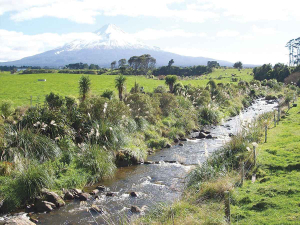Editorial: RMA reforms uproar
OPINION: The euphoria over the Government’s two new bills to replace the broken Resource Management Act is over.
 Four industry groups have joined together to say they have concerns about the implementation of freshwater farm plans.
Four industry groups have joined together to say they have concerns about the implementation of freshwater farm plans.
Beef + Lamb New Zealand (B+LNZ), Federated Farmers, DairyNZ, and Deer Industry New Zealand (DINZ) say while they support the use of farm plans as a tool, they have concerns about the implementation and short timeframes the Government is working to.
Freshwater Farm Plans are a practical way for farmers and growers to identify, manage and reduce the impacts of farming on the freshwater environment.
From August 2023, they will be required in parts of the Waikato and Southland and will then be rolled out to all regions by the end of 2025.
The four agricultural groups have been working through the new Freshwater Farm Plan regulations, released earlier this month, and talking directly with Ministers and officials to improve environmental outcomes in a way that is fair, practical, and cost-effective for farmers.
While they agree the Government has made some improvements, all four say there are still significant issues that remain unsolved and important details still need to be worked through.
B+LNZ chair Kate Acland says everyone acknowledges farm environment plans have an important role to play, however, these plans and the processes around them need to be practical for farmers, “and not tie them up in unnecessary red tape and costs”.
“The key issues include the very low 20ha threshold requiring all farmers to have a certified plan, addressing uncertainty over how existing regional or sector plans will be integrated with the Government’s new regulated plans, and details of how the regulations will be implemented by regional councils,” she says.
Federated Farmers acting president Wayne Langford says the Government has signalled they are willing to address some of the concerns that have been raised with them, but, he says, there needs to be urgent action on that to give farmers certainty.
“We don’t want to see excessive costs heaped onto farmers who are already under significant financial pressure, or unnecessary duplication of the work that’s gone into existing industry or regional plans,” Langford says.
“This needs to be a carefully managed process with a sensible transition,” he says.
DINZ chair Mandy Bell says farmers are responding to the requirements for better land management and DINZ has been working to help farmers with deer to have farm environment plans.
However, she says, the Government’s focus needs to be on working to achieve better environmental outcomes in a cost-effective and practical manner, “and not simply imposing cost to record compliance”.
Meanwhile, DairyNZ chair Jim van der Poel says he encourages the Government to work with industry to get the issue right, so farmer confidence isn’t undermined.
“The Government has committed to recognising existing plans. However, the sector needs more detail on how existing regional, industry and sector-led plans will transition to regulated freshwater farm plans over reasonable timeframes,” he says.
An initial programme is due to be rolled out by the Government over the next few months. The sector groups are committed to working with the Government to help it understand the practical implications of these Freshwater Farm Plan regulations at a farm level and will be watching the pilot programmes in Waikato and Southland closely.
They are calling on the Government to continue to take sector feedback on board and to act quickly to turn their stated willingness to address our concerns into concrete action.
Fonterra’s impending exit from the Australian dairy industry is a major event but the story doesn’t change too much for farmers.
Expect greater collaboration between Massey University’s school of Agriculture and Environment and Ireland’s leading agriculture university, the University College of Dublin (UCD), in the future.
A partnership between Torere Macadamias Ltd and the Riddet Institute aims to unlock value from macadamia nuts while growing the next generation of Māori agribusiness researchers.
A new partnership between Dairy Women’s Network (DWN) and NZAgbiz aims to make evidence-based calf rearing practices accessible to all farm teams.
Despite some trying circumstances recently, the cherry season looks set to emerge on top of things.
Changed logos on shirts otherwise it will be business as usual when Fonterra’s consumer and related businesses are expected to change hands next month.

OPINION: Here w go: the election date is set for November 7 and the politicians are out of the gate…
OPINION: ECan data was released a few days ago showing Canterbury farmers have made “giant strides on environmental performance”.